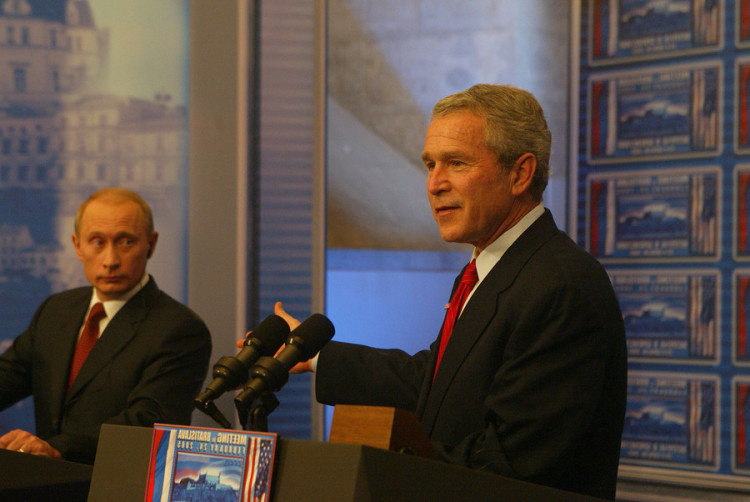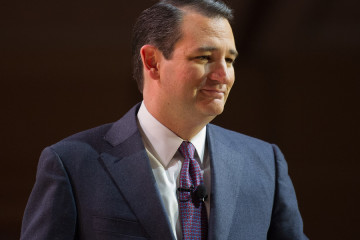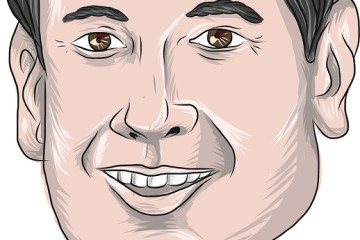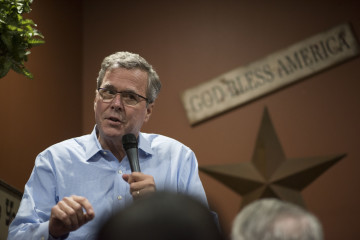Here’s A Bush Who Can Promote His Handling of Hurricanes

©2015 Bloomberg News
NTPKTB6KLVRD
(Bloomberg Politics) — Republican presidential candidate Jeb Bush has spent much of his campaign so far trying to prove that he’s not riding the coattails of his brother and father. To distinguish himself from the two former presidents, he’s emphasized his immersion in Latino life—his marriage to a Mexican American woman, his mastery of Spanish, his deep roots in Miami—to the point he considers himself bicultural. He’s also distanced himself, often reluctantly, from his brother, former President George W. Bush, on issues such as the Iraq war and fiscal discipline.
But perhaps nothing reflects so favorably on the latest Bush to seek the White House as the difference between how he, in stark contrast to his father and brother, handled the fury of nature.
“It’s a favorable comparison, for sure,” said former U.S. Senator Mel Martinez, a Florida Republican with ties to the Bush family.
On Wednesday, as President Barack Obama was preparing to head to New Orleans to mark the 10th anniversary of Hurricane Katrina, a storm whose mismanaged aftermath remains one of the low points of George W. Bush’s administration, Jeb Bush was marking a hurricane anniversary of his own. In his case, it was a success story.
One of the crown jewels of Bush’s eight years as governor was his handling of the historic 2004 and 2005 hurricane seasons, when eight hurricanes and four tropical storms hit the state. An emergency was declared in each of the state’s 67 counties at least once and every school district closed due to hurricanes in 2004. The 2005 storms included Hurricane Wilma, which caused $20.6 billion in damages in southwest Florida, the state’s most expensive storm since 1992.
How did his constituents score their governor’s performance? Bush’s approval ratings were never higher.
“In Florida, we delivered,” Bush said Wednesday in Pensacola, Florida, one of the communities that suffered the most damage during the period.
Bush presented the story as a testament to his executive ability. “I’ve learned a little about leadership through trial and error,” he added. “You learn these things by experience. You don’t talk about things on the sidelines.”
At least part of Bush’s instinct to be front and center during the storms a decade ago may have been informed by criticisms of his father, then-President George H.W. Bush, for moving too slowly with federal disaster aid after Hurricane Andrew tore through Miami—his son’s hometown—in August 1992. The elder Bush lost re-election a few month later, forced to deploy precious campaign resources to Florida, which he won by just 2 percentage points after victory margin of 22.4 points four years earlier.
In 2004, Jeb’s older brother, George W. Bush, joining his younger brother on a muggy September day that year to pass out bags of ice and bottles of water to residents of Florida’s Treasure Coast whose homes were damaged days earlier in Hurricane Frances. The then-president visited the state four times in six weeks—talking to citrus farmers in Central Florida about crop damage, praising National Hurricane Center workers in Miami. Two months later, Bush defeated Democratic presidential nominee John Kerry in the state by 5 percentage points on his way to winning a second term. Bush’s margin of victory was the widest of the four presidential contests held so far this century in the nation’s largest electoral swing state.
But the lesson didn’t stick with the second Bush president. A year later, he botched the response to Hurricane Katrina, watching mostly from afar as New Orleans flooded and his approval ratings sank to what were then the lowest point of his presidency.
Jeb Bush’s campaign is handling the inevitable comparisons with delicacy.
“We think Jeb’s hurricane experience is so unique and intrinsic to his governorship that it will stand on its own as we tell the story over the course of the campaign,” Bush spokesman Tim Miller said when asked about the family comparison. “Jeb’s going to rise and fall on his own merits. Of course people will compare various things to his family, but he has a story to tell that if we do our job will really resonate with people.”
On Wednesday, just days before the 10th anniversary of Katrina making landfall in Louisiana, Jeb Bush reminded people that the hurricane hit Florida first, and that the state’s law enforcement, fire marshals and others were among the first to respond with help for their Gulf Coast neighbors.
Bush said many of those responders were waiting for the storm to hit the Florida Panhandle.
“The storm waggled back to the west, and I said, ‘Keep going, we’ll figure out how to get reimbursed later,” Bush said Wednesday during a town-hall meeting in Pensacola, Florida. “I am really proud of how we do things in Florida.”
In Florida, Bush focused on hurricane preparations early. Perhaps his most important move was installing Craig Fugate as director of the Florida Division of Emergency Management, who began his emergency management career as a volunteer firefighter, served as a county emergency manager in Florida, and was tapped in 1997 by Florida’s Governor Lawton Chiles, a Democrat, to head the state’s emergency preparedness and response. That compares to George W. Bush’s head of FEMA, Michael Brown, had relatively little experience in emergency management before taking over the post. Fugate was so well respected that he later was picked up by President Barack Obama, and now serves as administrator of the Democratic president’s Federal Emergency Management Agency.
“It’s a classic example where making a key appointment still counts,” said John Harrald, the former director of the George Washington University Institute of Crisis, Disaster and Risk Management. “No leader can know everything, but they have to be smart enough to put good people around them. When the storms hit Florida, Jeb Bush had professional experience on the ground. And George W. Bush lost control of the event.”
In Florida, Bush was regularly on site where storms hit. He held regular news conferences, speaking in both English and Spanish. E-mails show he was in direct contact with emergency managers, often passing along concerns from residents who couldn’t find supplies or were having trouble collecting insurance.
In September 2004, just before the fourth storm hit the state that year, Bush’s approval rating was at 62 percent, the highest in three years that Quinnipiac University measured his standing.
“It was probably a high-water mark in many ways during his time as governor,” said Matthew Corrigan, a University of North Florida political scientist professor who wrote a book, “Conservative Hurricane,” about Bush’s two terms as governor. “It was a 9-11 type moment as governor and he responded to it.”
To contact the author on this story: Michael C. Bender at mbender10@bloomberg.net To contact the editor on this story: Kathy Kiely at kkiely9@bloomberg.net






No Comment